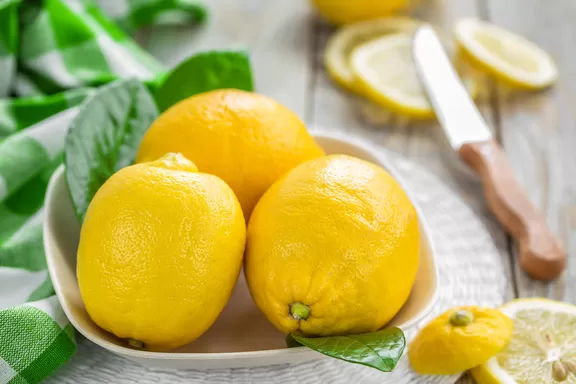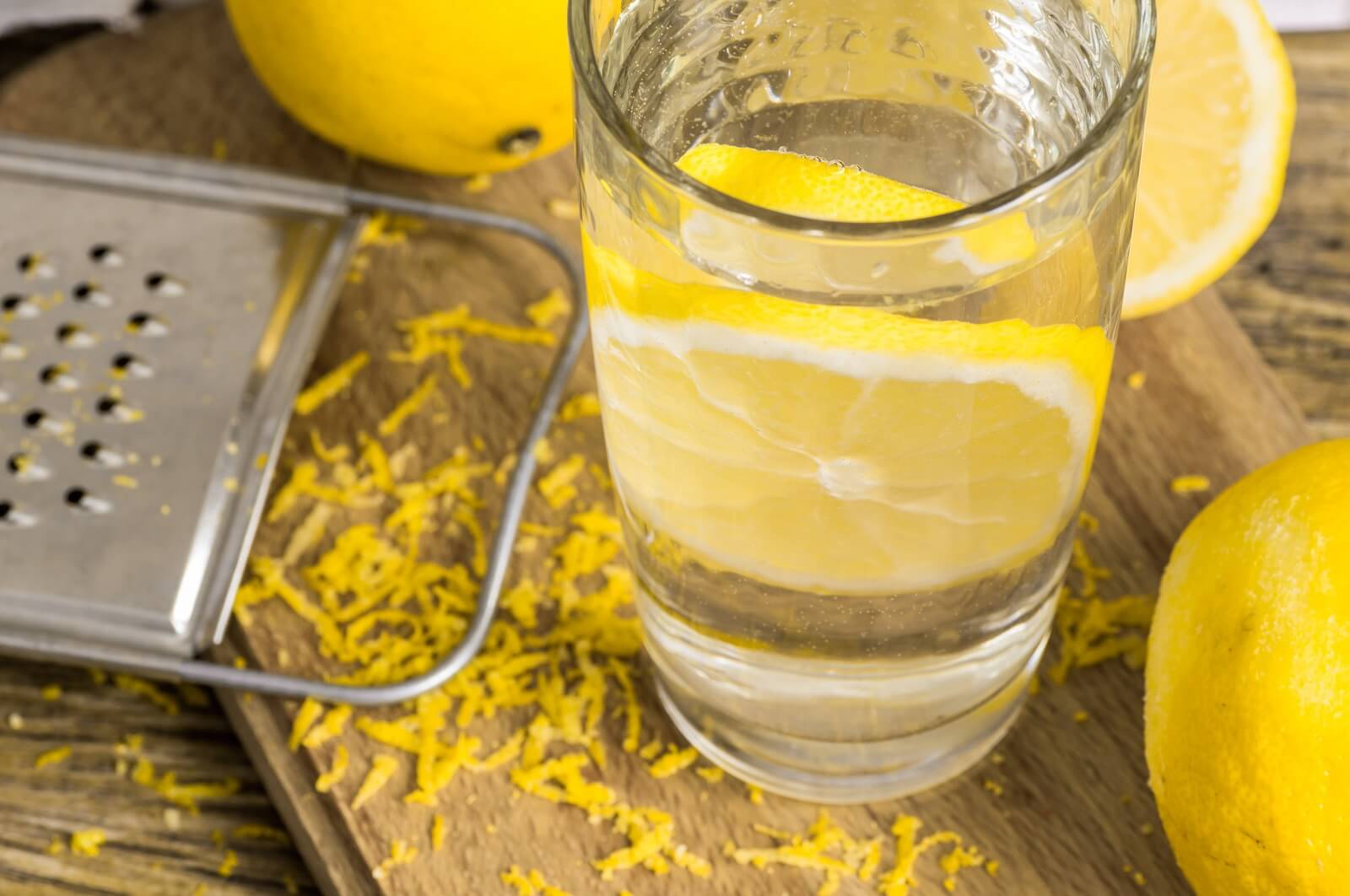
Lemon (Citrus limon) juice can help relieve constipation, but probably not as good as prune juice. The 3 key things that lemon juice (with the fiber pulp in it) has that might help with constipation are:
- Water
- Fiber
- Citric acid
Although you may have heard that the vitamin C in lemon juice will help you have a bowel movement, there is not enough in a glass of this juice to diminish the intestine’s ability to absorb around 70% to 90%(source 13) before it gets too far into the gastrointestinal system. So, there isn’t going to be much of it available to help.
But, as is common knowledge, a diet rich in fiber does help with constipation. And, one of the first lines of treatment for constipation is ensuring you are getting enough water. Lastly, citric acid, this may surprise you, but it may help you poop.
Does Lemon Water Help you Poop?
Lemon water is essentially watered down lemon juice, so it is going to lack 2 of the 3 things that might help you have a bowel movement: fiber and citric acid. Essentially, full strength lemon juice with the pulp should be better for helping with constipation than an equal amount of lemon water.
Essentially, because lemon water is watered down lemon juice, the therapeutic value of the lemon is attenuated.
But, if you make it a point to up your water intake via drinking lemon water, then it might help you have a bowel movement. But, don’t count on it to be much different than regular water aside from a lemon taste (if you water down the lemon juice a lot, or just use a slice of lemon in water).
What to do Instead of Lemon Juice / Lemon Water
If you’re into herbal medicine, one expert you want to be aware of is the late Dr. James Duke. Dr. Duke wrote several books and was a famous herbal medicine proponent. He worked for a time as a USDA botanist with the Agricultural Research Service. There is a lot of information about him on the USDA website, here is one cool page: The Duke of Herbs (and Medicinal Plants).
Concerning constipation, Dr. Duke recommends prune juice in his book The Green Pharmacy.(source 1) According to this natural medicine expert, prune juice is a “safe, effective, gentle laxative.”
So if you are looking for a juice to drink for constipation, reach for some prune juice any day over lemon juice. But, drinking enough water is going to be a good step at getting regular, and lemon water tastes good and is an easy way to stay properly hydrated!
Samuel Bart’s Digestive Health Solution
Samuel Bart has always been passionate about plants and their ability to keep us healthy. He has put together some of the best natural ways that could help anyone support a healthy digestive system.
Samuel perfected an easy, yet powerful formula, which consists of amazing ingredients. Bart’s supplement is backed by a ironclad 60-day, money back guarantee.

Citric Acid in Lemon Juice Relieves Constipation
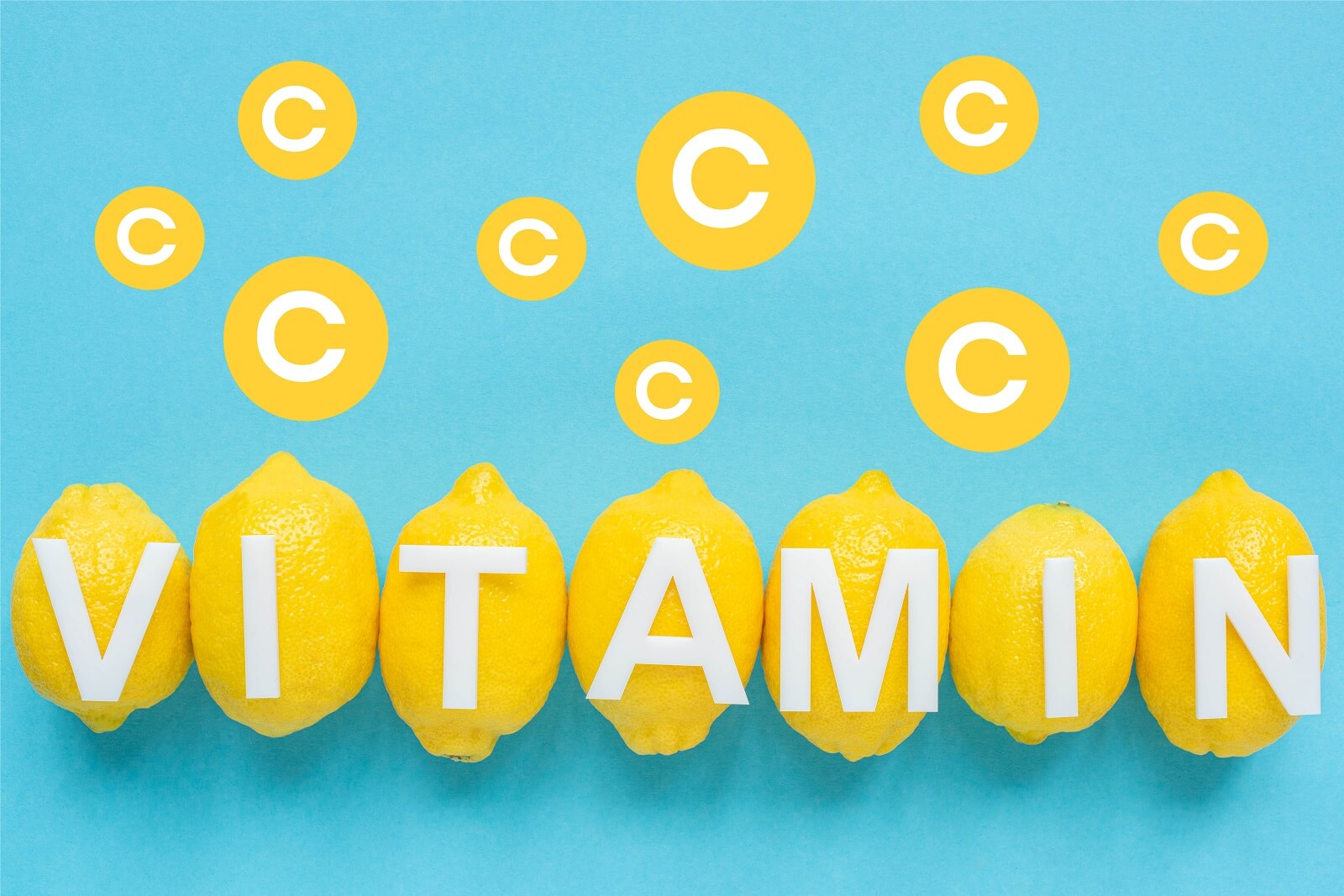
According to the 2006 book Anorectal Malformations in Children(source 3) several organic acids, like citric acid, are thought to help intestinal peristalsis (the wave-like contractions that move material through the digestive system).
Lemon juice has on average 1.44 g/oz (48.7 mg/mL) of citric acid in it.(source 2) And, of course, lemon juice is a good way to get citric acid naturally through the diet.
A 2022 study in the Journal of Medicinal Food(source 4) looked at how citric acid, ripe and unripe plums (Prunus mume), and malic acid affected constipated rats. To evaluate these treatments efficacy, bisacodyl (a common laxative drug) was given to a different group of rats.
The study treated the rats in two ways: a pre-treatment group received the treatments (including citric acid) 3 days before being constipated, and a post-treatment group received the treatments after 5 days of being constipated.
The study found in both treatment groups the feces number, weight, and moisture of rats given citric acid in the pretreatment group were all better than those given bisacodyl. Post treatment group rats given citric acid also had scores as good or better than bisacodyl for these benchmarks.
The study also concluded that ripe plums were better for relieving constipation than unripe plums. This was because citric acid (in the ripe plums) was the primary active compound that got rid of the constipation.
Citric acid was found to be better than malic acid at stopping constipation; and, as the plums ripened the citric acid content went up and malic acid content went down.
The study concluded: The results of our study have proven through animal experiments that [ripe plum fruit], especially citric acid, is effective for improving the symptoms of constipation.
Guaranteed 24 Hour Constipation Relief
Dr. Scott McLeod, PharmD received his doctorate from the WSU College of Pharmacy. His book on constipation is guaranteed to show you how to get relief in 24 hours or less-or your money back (60 day, 100% refund guarantee).
Everything used in this plan is from nature. No use of harmful laxatives. People who have used these say they work BETTER than over-the-counter laxatives!

Vitamin C in Lemon Juice & Constipation
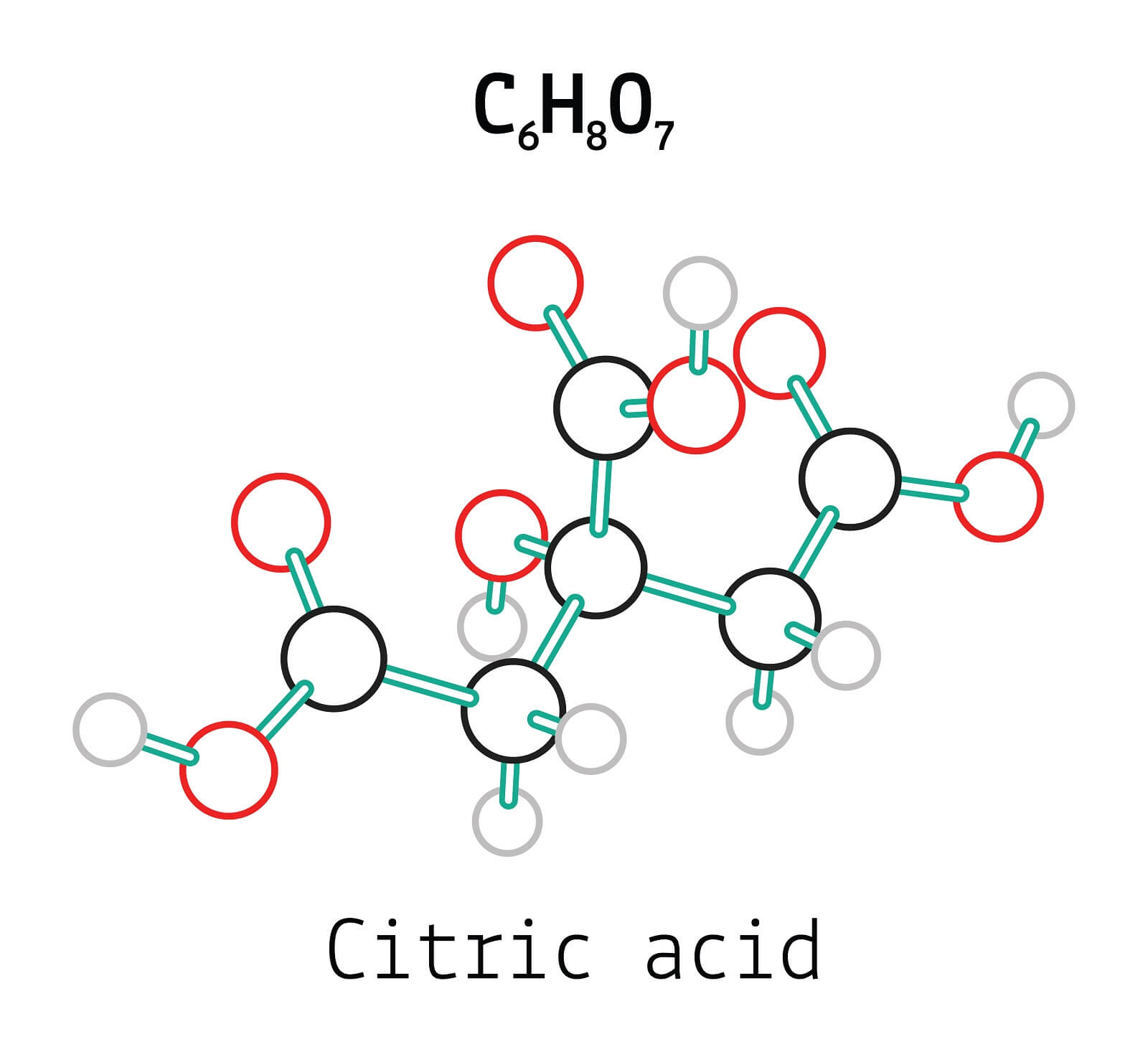
The first question we need to answer is: “how much vitamin C is in lemon juice?” Well storage affects the amount of vitamin C in lemon juice. The amount of vitamin C in fresh and industrial lemon juice is as follows:
- Fresh Lemon Juice: approximately 42 mg/100 mL(source 5)
- Industrial Lemon Juice: approximately 19 mg/100 mL(source 5)
Let’s look at how much vitamin C it takes to relieve constipation.
A 2020 study in the International Journal of Biological Chemistry(source 6) looked at how vitamin C would impact diarrhea in rats. The rats were given vitamin C in amounts ranging from 25 to 150 mg/kg of body weight.
The study found that 100 and 150 mg/kg of body weight reduced the number of wet stools.
But this doesn’t mean that it will cause constipation. The study goes on to say that the reason vitamin C stopped the diarrhea is due to its antioxidant capability.
The study authors also state that vitamin C was found not to have any ability to reduce the motility of the intestinal tract. Quoting the study, the author’s state the following:
The non-significant reduction in the small intestine transit by vitamin C suggests that it has no anti-motility activity. This suggests that the antidiarrheal activity of vitamin C is due to its antioxidant activity rather than its ability to inhibit prostaglandin synthesis since prostaglandin can stimulate gastrointestinal motility.
International Journal of Biological Chemistry [(2020) 14: 8-13]
Vitamin C can cause diarrhea in high doses, but you won’t be able to drink enough lemon juice realistically to ever get to this level of dose, per the aforementioned amounts of vitamin C in this juice.
It takes a very large dose of vitamin C to have diarrhea. This dose could range from over the tolerable upper limit of 2 g/day to over 3 g to have diarrhea.(source 7) Yet, anecdotal accounts suggests that it could only take 1 g/day to cause diarrhea.(source 8)
Naturally Treat Hemorrhoids in 48 Hours
Jessica Wright’s unique 5-step, all-natural approach to hemorrhoid treatment delivers permanent relief. Heal hemorrhoids in 48 hours, and eliminate the root cause in 30 to 60 days.
Benefit from Jessica’s 12 years of research; her book is backed by a 60 day, 100% money back guarantee.

Why Vitamin C Causes Diarrhea
Ingesting high doses of vitamin C can cause osmotic diarrhea.(source 9) According to a book provided by the U.S. National Library of Medicine: Osmotic diarrhea results from the presence of osmotically active, poorly absorbed solutes in the [hollow inner space of the bowel] that inhibit normal water and electrolyte absorption.
(source 10)
The definition of osmotic from the U.S. National Cancer Institute is as follows:
Having to do with osmosis (the passage of a liquid through a membrane from a less concentrated solution to a more concentrated one). This causes the more concentrated solution to become diluted, and makes the concentrations in both solutions more equal. Osmotic also refers to a type of laxative that increases the amount of water in the large intestine, which softens the stool to help it pass more easily.
NCI Dictionary of Cancer Terms - U.S. National Cancer Institute
But, the key thing to remember here is that vitamin C needs to be poorly absorbed cause a greater effect.
According to the U.S. National Institutes of Health(source 12) and a 2021 study in Antioxidants(source 13) around 70% to 90% of vitamin C is absorbed at moderate doses of 30 to 180 mg/day. With doses above 1 g/day absorption drops to less than 50%.
The 2012 study in Antioxidants(source 13) states: Vitamin C is proficiently absorbed in the proximal small intestine [the upper section joined to the stomach], as is generally the case with vitamins.
Given the aforementioned findings of the amount of vitamin C in lemon juice, a 12 ounce glass (approximately 355 ml) of fresh lemon juice will have about 149.1 mg of vitamin C in it. This means it falls into the aforementioned range of under 180 mg/day for good absorption.
So, for vitamin C to have a powerful osmotic effect, it would have to be not well absorbed; requiring a high dose that a single glass of lemon juice doesn’t have.
Dr. John Herzog (MD)
Dr. John Herzog, a "survival surgeon" from Maine explains what home remedies work best in a crisis situation.
This may be important in the event you require first-aid or are in an emergency situation without easy access to a hospital. Dr. John Herzog has assembled a large collection of home remedies for such scenarios.

Does Drinking Lemon Water Help with Constipation?
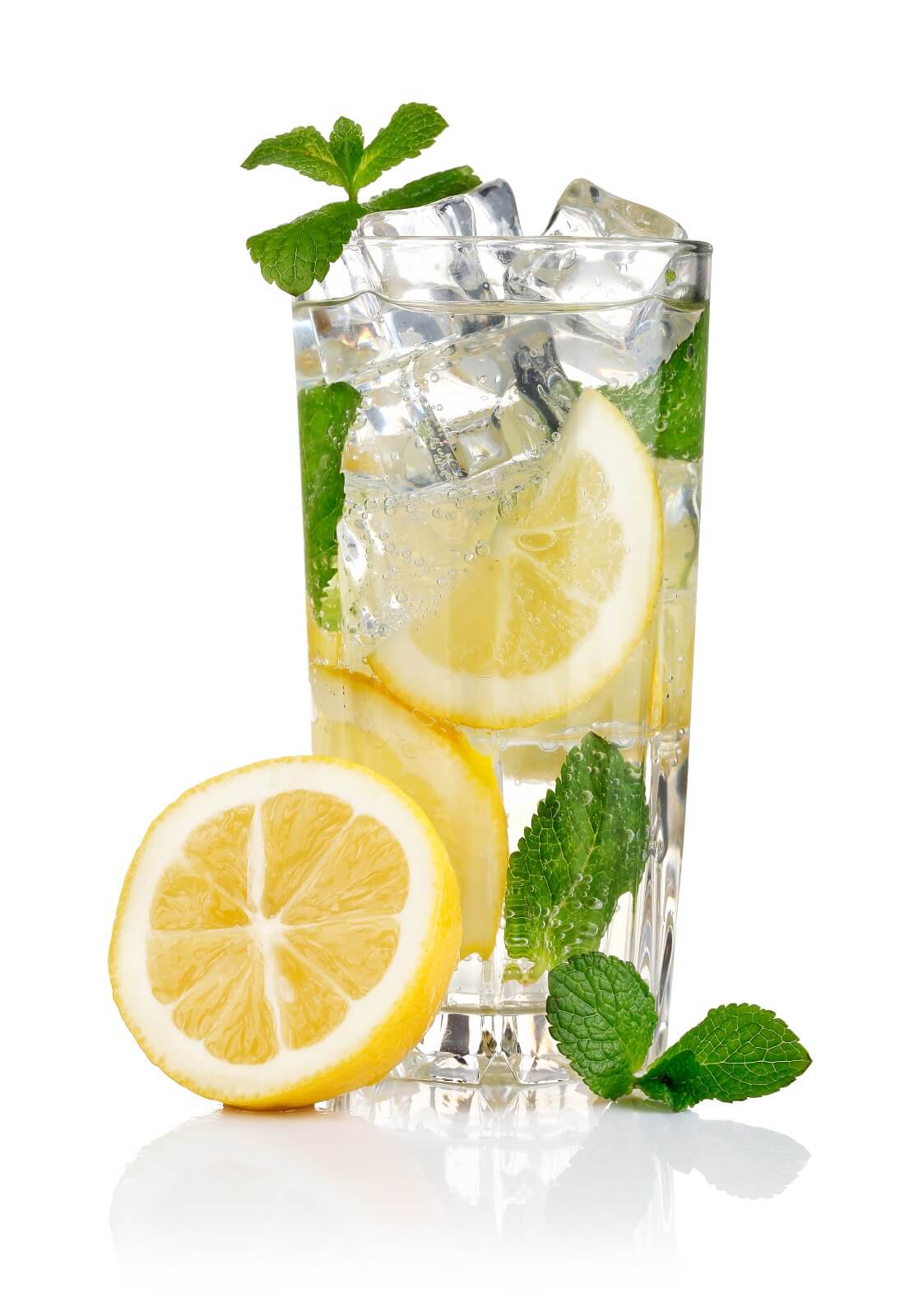
As you know, lemon water is effectively watered down lemon juice. So, by adding water we are reducing the concentration of citric acid, fiber from pulp, and vitamin C. So, 1 part lemon juice mixed with 1 part water is going to have every phytochemical (plant chemical) and nutrient in 100% lemon juice reduced by half.
Some people may consider the right recipe for lemon water as just putting a slice or two of lemon in water, or a squeeze of the juice into water. This method will result in dramatically less of the components in lemon juice actually being there.
In essence, by adding water to lemon juice you attenuate the benefits of that juice.
So the real reason lemon water can help with constipation is not the lemon or lemon juice at all. It is the dominant ingredient in lemon water: water!
One of the best ways to have a bowel movement (and I know from experience) is to fast (not eat food) and drink only water.
I would also add that I recently tried drinking some salt water after about 2 and a half days having nothing but zero calorie fluids (e.g., black coffee, diet soda). To my surprise I had a good bowel movement a few hours later. I would definitely recommend trying to fast for 24 hours without food and then having a glass of salt water.
Research on Water Intake’s Effects on Constipation
A 2020 study in the Journal of the American College of Nutrition(source 14) looked at how water intake influenced constipation. The study involved 4,561 participants (1,812 male and 2,749 female) aged between 18 and 65 years.
The study states that lacking fluid and water consumption is generally accepted as a risk factor for constipation. And also quotes the European Food Safety Authority that suggests men get 2500 mL/day and women get 2000 mL/day.
The study found that people drinking the least water had the highest incidence of constipation, which was 19%. People in the middle upper quartile (a quartile is a segmentation of observations into four defined groups) of water intake had less of a chance of being constipated when compared to those in the lowest quartile of water intake.
This study also cites a 2019 study by Shen, et al.(source 15) and states this study also found that lacking water was associated with constipation.
The 2019 study by Shen, et al. found, when looking at water intake alone as a predictor for constipation, it was found to be associated with constipation.
A 2021 study in Nutrients(source 16) suggests water, especially mineral water which can have magnesium or bicarbonate in it, be used as a first line of treatment for chronic constipation. The study states:
The first line treatment for [chronic constipation] involves an adequate intake of water (1.5–2 L/day), even though this is not based on strong scientific evidence. Despite the colon’s high capacity for absorption of ingested water, the laxative action of waters, especially those rich in magnesium and sulfates, has been known for a long time.
Nutrients [13.10 (2021): 3386]
Claire Goodall’s Amazing Guide
Clair Goodall is a bee-obsessed, natural medicine convert from Minnesota (USA). And, she does keep bees!
Clair has created 350+ page book documenting how to replace the toxic products and medications in your home with healthier, all-natural alternatives.

A Natural Digestive System Supplement that Helps
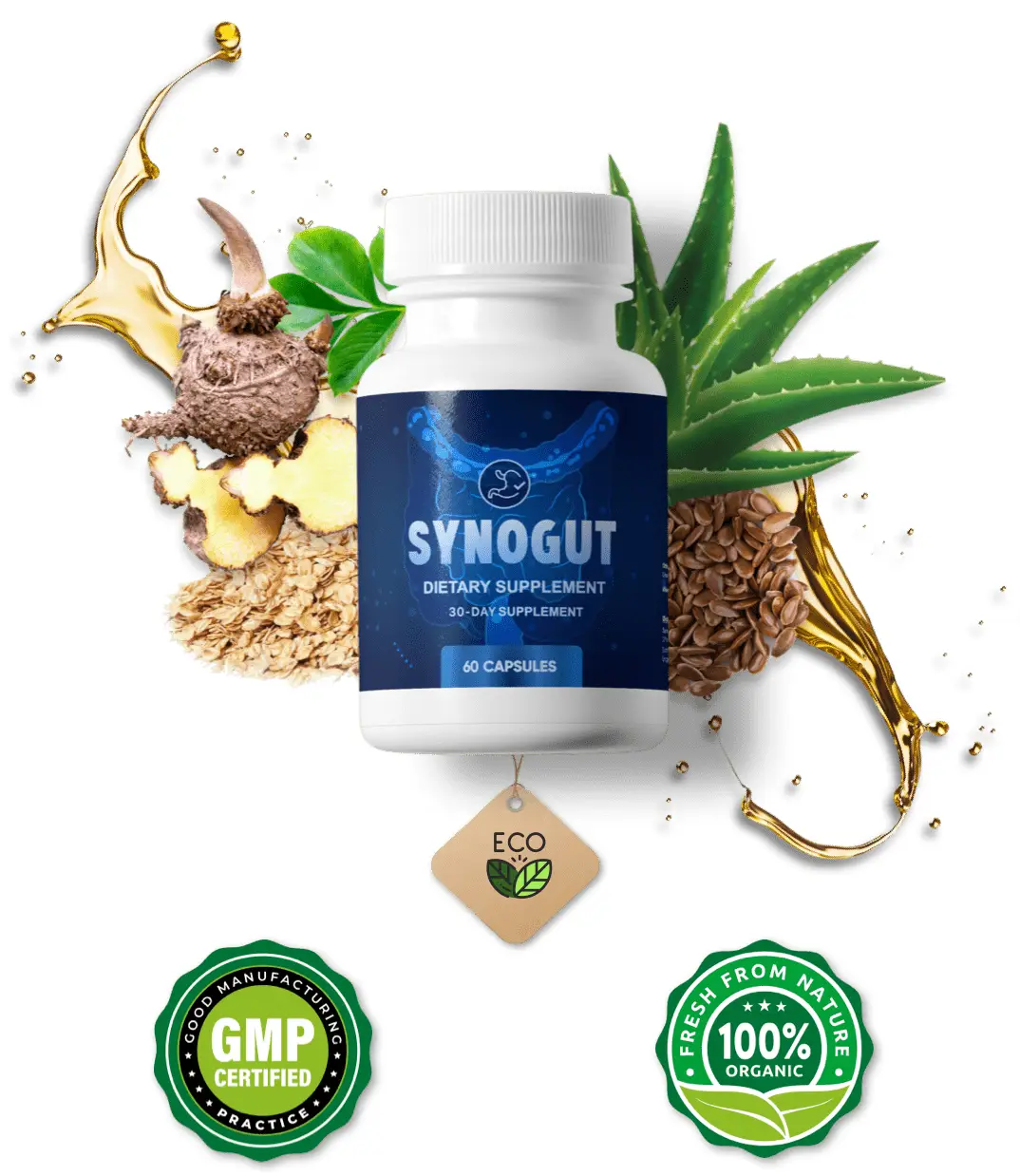
If you have been struggling with digestive problems like constipation, you should know about Samuel Bart. Mr. Bart lives with his wife, Alma, in Nashville, Tennessee.
Mr. Bart has always had a passion for plants and how to use them medicinally. He went on to research some of the most effective ways that could help people support a healthy digestive system.
To this end, Mr. Bart developed a product he calls “SynoGut.”
Every capsule of this supplement is made in the USA, in a FDA approved, and GMP certified, facility under sterile, strict, and precise standards. Synogut capsules are non-GMO. You can rest assured that they do not contain any dangerous stimulants or toxins, and more importantly, they are not habit forming.
His proprietary blend blend contains the following ingredients:
- Psyllium husk
- Bentonite clay
- Black walnut hull
- Oat bran
- Flaxseed
- Prune fruit
- Aloe vera leaf
- Lactobacillus acidophilus (a probiotic bacteria)
- Apple fruit pectin
- Glucomannan root
If this is not the first time you have had constipation, you might benefit from the power these natural items can provide. And, if you have had prolonged constipation, utilizing a supplement like Mr. Bart’s could help you become more regular—without an arsenal of prescription drugs.
Many people have tried synthetic drugs to solve their constipation issues; and if these didn’t work, it may be hard to invest in a natural remedy like SynoGut. To this end, Mr. Bart offers a 60 day, full refund guarantee on his supplement.
If you decide to invest in Mr. Bart’s supplement, and are not satisfied with the results, you can quickly request a refund. SynoGut will promptly refund your purchase; ensuring there is no risk to give Mr. Bart a chance.
SynoGut is sold via the large online retailer ClickBank—a company based in Boise Idaho, USA. ClickBank sells products across the world, and ensures you can get a refund if you are not satisfied with SynoGut’s results.
If you are in a situation where you have “tried everything,” SynoGut is worth the quick purchase and a solid test drive. If you would like to learn more about Samuel Bart’s SynoGut supplement, you can do so at the SynoGut website.
About the Author
Geoff Kent is a natural medicine enthusiast who has been researching and writing about natural medicine since 2008. Geoff is primarily a web developer, but also researches and authors written and video content about natural health. Geoff has a bachelor’s degree in Management Information Systems from the University of Northern Iowa.
More on Geoff KentImportant Disclosures & Disclaimers
It is important to use the information you find on Herbsey.com in the right way. Also for legal reasons, these disclaimers and disclosures are necessary. For further information about each, feel free to click the link provided to the page on this website that provides more information.
Medical Disclaimer
The information on this website is not a prescription for anyone. This information is for informational or educational purposes only, and is not a substitute for professional medical advice or consultations with healthcare professionals.
Advertisement Disclosure
Some of the links provided on this article and website are affiliate links. If you purchase a product after clicking on these links, Herbsey.com will earn a commission. Herbsey.com promotes various products through advertisement and text links. For more information: Our Advertisements.








